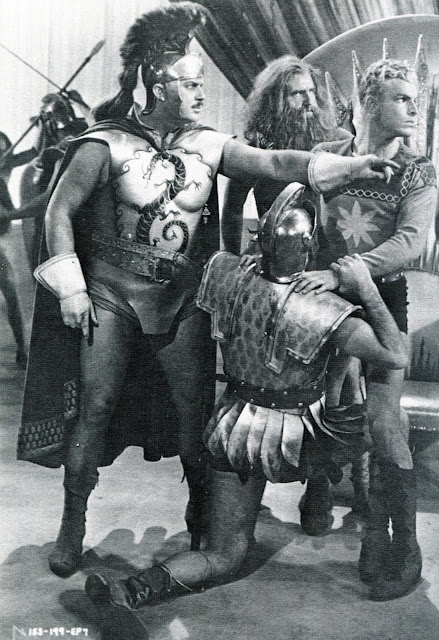A world of
realistic fantasy suffers from a significant drawback. Namely, “realism” is an
illusion that resembles reality – the logical side. The Marvel Studio films are
logistic tour de forces but, as Scorcese says, not psychically or
psychologically interesting (enough).
One can confuse
what looks real with reality, which is a mixture of physical and psyche.
Though not
convincing in a realistic sense, the special effects possess an almost
dreamlike quality, and do work within the self-contained comic-strip inspired
world of the serial, a world in which only a handful of shots depicting normal,
realistic scenery are allowed to intrude. (The Flash Gordon serials, Kinnard etal, McFarland 2008,
page 13).
The world, the
whole universe (to conquer), often resides in the imagination and is not
realistic in the logistical sense. The lasting value of the Flash Gordon
serials is their “innocent screen fantasy”; innocence that comes from fidelity
to the original Alex Raymond classic, and a lightness of touch that the “rough”
physical values might even favour!
Lightness is
very difficult to pull off in modern blockbusters; it’s partly physical grace,
partly speaking lines with nonchalant aplomb. Physical grace really depends on
simple athleticism which Crabbe and Alexander (as Prince Barin) demonstrate
with ease.
Barin, in his
ornamental chestplate, resembles a circus strongman with luxuriant thighs. His
type is almost the DH Lawrence ideal of a heroic individual who is both a
natural aristocrat and a bit of a roughneck.
In fights, he is
able to lift up opponents and casually throw them. This sort of primitivism
represents an ideal balance between the resourceful mind, and the ability to
carry things out with physical might.
The body is
ideally balanced between the psyche and the physical, the definition of the super-man;
one who is “more than a man” (Hyborian Bridge 81), who is not purely
head. When the body is balanced with the head, it’s often true to say that song
and dance come into their own.
Song comes from
the throat, representing an ideal balance; dance is a rhythmic expression of
the soul by the loose limbs.
Daintiness and
delicacy of movement are signs of a balanced culture. Cultures that are
romantic, that are not driven (to distraction) by the ego of endless acolytes
of dead sorcerers. Whensong, ritual, ceremony, pageantry are meaningful there
is grace, there is romance, queens and knights, kings of renown.
Flash Gordon, as a representative of heroic fantasy,
has this enduring quality. Ming, as the techno-sorcerer run amock, bears
comparison to both Wizard of Oz and Howard. Alexander, as Prince Barin,
I noticed bears a passing resemblance to Scott McKenzie of..
..The innocence
of the 60s, where sex and drugs had a soulful sense of place. Innocence, song
and soul and a rightful sense of balance is a culture of “people in motion”.
Innocence is
truth because it is not realism – which is simply an illusion of the head
(words). Innocence is the throat raised to the sky. It is the dainty pursuits
of the body in motion.
(compare with
the grim pursuits of modern ball games)
Realism – in terms
of words and news – cannot be light of grace, since it has no psychic/physical
balance. It is the pure ego of a maddened Ming the Merciless.
Realism of news
is not the physical grace of sun and moon, Earth and stars, it is simply the
facts that happen to exist in the world “they” have made to rule - conquerors of their universe.
